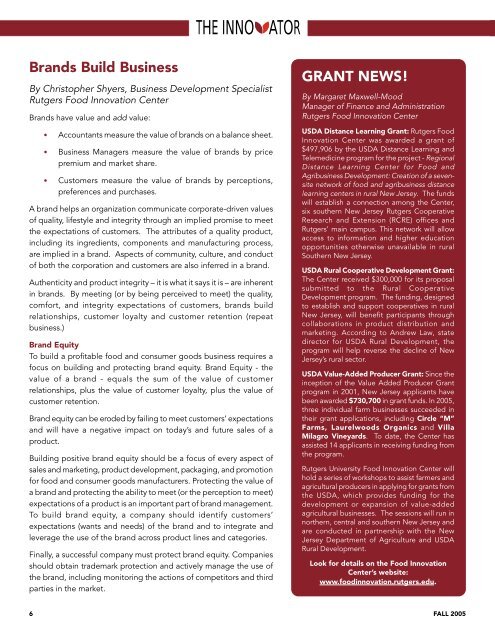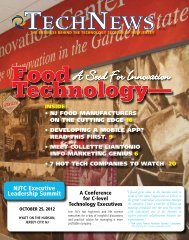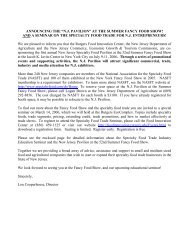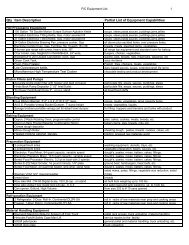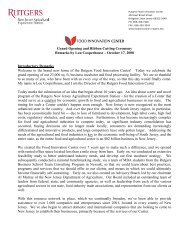THE INNO ATOR - Rutgers Food Innovation Center
THE INNO ATOR - Rutgers Food Innovation Center
THE INNO ATOR - Rutgers Food Innovation Center
Create successful ePaper yourself
Turn your PDF publications into a flip-book with our unique Google optimized e-Paper software.
<strong>THE</strong> <strong>INNO</strong><br />
<strong>ATOR</strong><br />
Brands Build Business<br />
By Christopher Shyers, Business Development Specialist<br />
<strong>Rutgers</strong> <strong>Food</strong> <strong>Innovation</strong> <strong>Center</strong><br />
Brands have value and add value:<br />
• Accountants measure the value of brands on a balance sheet.<br />
• Business Managers measure the value of brands by price<br />
premium and market share.<br />
• Customers measure the value of brands by perceptions,<br />
preferences and purchases.<br />
A brand helps an organization communicate corporate-driven values<br />
of quality, lifestyle and integrity through an implied promise to meet<br />
the expectations of customers. The attributes of a quality product,<br />
including its ingredients, components and manufacturing process,<br />
are implied in a brand. Aspects of community, culture, and conduct<br />
of both the corporation and customers are also inferred in a brand.<br />
Authenticity and product integrity – it is what it says it is – are inherent<br />
in brands. By meeting (or by being perceived to meet) the quality,<br />
comfort, and integrity expectations of customers, brands build<br />
relationships, customer loyalty and customer retention (repeat<br />
business.)<br />
Brand Equity<br />
To build a profitable food and consumer goods business requires a<br />
focus on building and protecting brand equity. Brand Equity - the<br />
value of a brand - equals the sum of the value of customer<br />
relationships, plus the value of customer loyalty, plus the value of<br />
customer retention.<br />
Brand equity can be eroded by failing to meet customers’ expectations<br />
and will have a negative impact on today’s and future sales of a<br />
product.<br />
Building positive brand equity should be a focus of every aspect of<br />
sales and marketing, product development, packaging, and promotion<br />
for food and consumer goods manufacturers. Protecting the value of<br />
a brand and protecting the ability to meet (or the perception to meet)<br />
expectations of a product is an important part of brand management.<br />
To build brand equity, a company should identify customers’<br />
expectations (wants and needs) of the brand and to integrate and<br />
leverage the use of the brand across product lines and categories.<br />
Finally, a successful company must protect brand equity. Companies<br />
should obtain trademark protection and actively manage the use of<br />
the brand, including monitoring the actions of competitors and third<br />
parties in the market.<br />
GRANT NEWS!<br />
By Margaret Maxwell-Mood<br />
Manager of Finance and Administration<br />
<strong>Rutgers</strong> <strong>Food</strong> <strong>Innovation</strong> <strong>Center</strong><br />
USDA Distance Learning Grant: <strong>Rutgers</strong> <strong>Food</strong><br />
<strong>Innovation</strong> <strong>Center</strong> was awarded a grant of<br />
$497,906 by the USDA Distance Learning and<br />
Telemedicine program for the project - Regional<br />
Distance Learning <strong>Center</strong> for <strong>Food</strong> and<br />
Agribusiness Development: Creation of a sevensite<br />
network of food and agribusiness distance<br />
learning centers in rural New Jersey. The funds<br />
will establish a connection among the <strong>Center</strong>,<br />
six southern New Jersey <strong>Rutgers</strong> Cooperative<br />
Research and Extension (RCRE) offices and<br />
<strong>Rutgers</strong>’ main campus. This network will allow<br />
access to information and higher education<br />
opportunities otherwise unavailable in rural<br />
Southern New Jersey.<br />
USDA Rural Cooperative Development Grant:<br />
The <strong>Center</strong> received $300,000 for its proposal<br />
submitted to the Rural Cooperative<br />
Development program. The funding, designed<br />
to establish and support cooperatives in rural<br />
New Jersey, will benefit participants through<br />
collaborations in product distribution and<br />
marketing. According to Andrew Law, state<br />
director for USDA Rural Development, the<br />
program will help reverse the decline of New<br />
Jersey’s rural sector.<br />
USDA Value-Added Producer Grant: Since the<br />
inception of the Value Added Producer Grant<br />
program in 2001, New Jersey applicants have<br />
been awarded $730,700 in grant funds. In 2005,<br />
three individual farm businesses succeeded in<br />
their grant applications, including Circle “M”<br />
Farms, Laurelwoods Organics and Villa<br />
Milagro Vineyards. To date, the <strong>Center</strong> has<br />
assisted 14 applicants in receiving funding from<br />
the program.<br />
<strong>Rutgers</strong> University <strong>Food</strong> <strong>Innovation</strong> <strong>Center</strong> will<br />
hold a series of workshops to assist farmers and<br />
agricultural producers in applying for grants from<br />
the USDA, which provides funding for the<br />
development or expansion of value-added<br />
agricultural businesses. The sessions will run in<br />
northern, central and southern New Jersey and<br />
are conducted in partnership with the New<br />
Jersey Department of Agriculture and USDA<br />
Rural Development.<br />
Look for details on the <strong>Food</strong> <strong>Innovation</strong><br />
<strong>Center</strong>’s website:<br />
www.foodinnovation.rutgers.edu.<br />
6 FALL 2005


